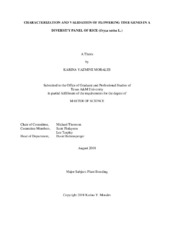| dc.description.abstract | In order to meet the needs of a growing population, rice production must be doubled by 2050 in comparison to 2005 production levels. However, rice production faces many challenges including rising temperatures, drought, and salinity stress. Flowering is one of the most heat sensitive periods of the rice life cycle, causing significant decreases to yield if temperatures are too high during the flowering process. As an agronomically important trait, days to flowering determines the climate rice varieties can grow in. Days to flowering is highly variable and quantitative in nature with over 30 genes known to control days to flowering. This study aimed to characterize genes controlling days to flowering through a genome wide association study (GWAS), analysis of genetic variation in known flowering time genes, and genome editing of two known flowering time genes. Genotyping of the material used in the GWAS was performed using a rice 7K SNP chip referred to as the Cornell-IR LD Rice Array (C7AIR).
The C7AIR successfully distinguished between the five subgroups of Oryza sativa; however, due to all varieties genotyped being inbred, the amount of heterozygosity was low, causing problems with identifying where the heterozygous cluster should fall when creating the custom cluster file in GenomeStudio. The GWAS identified 5 candidate loci which contribute to days to flowering, including a region co-localizing with the known flowering time genes Hd3a and RFT1. The five genes analyzed for structural variation were highly conserved among the varieties observed with no nonsense, and few missense mutations being observed. Guide RNAs were designed to knockout the function of Hd3a and RFT1; however, the ribonucleoprotein (RNP) transfection was unsuccessful due to the need for optimizing the rice protoplast isolation protocol. | en |


